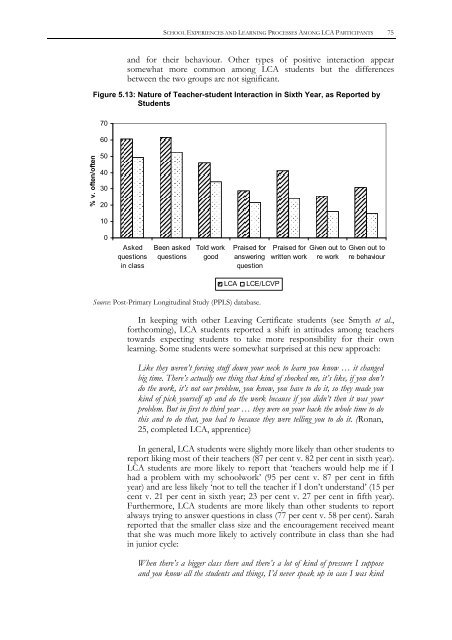Student Experiences of the Leaving Certificate Applied Programme
Student Experiences of the Leaving Certificate Applied Programme
Student Experiences of the Leaving Certificate Applied Programme
You also want an ePaper? Increase the reach of your titles
YUMPU automatically turns print PDFs into web optimized ePapers that Google loves.
SCHOOL EXPERIENCES AND LEARNING PROCESSES AMONG LCA PARTICIPANTS 75and for <strong>the</strong>ir behaviour. O<strong>the</strong>r types <strong>of</strong> positive interaction appearsomewhat more common among LCA students but <strong>the</strong> differencesbetween <strong>the</strong> two groups are not significant.Figure 5.13: Nature <strong>of</strong> Teacher-student Interaction in Sixth Year, as Reported by<strong>Student</strong>s% v. <strong>of</strong>ten/<strong>of</strong>ten706050403020100Askedquestionsin classBeen askedquestionsTold workgoodPraised foransweringquestionPraised for Given out to Given out towritten work re work re behaviourLCALCE/LCVPSource: Post-Primary Longitudinal Study (PPLS) database.In keeping with o<strong>the</strong>r <strong>Leaving</strong> <strong>Certificate</strong> students (see Smyth et al.,forthcoming), LCA students reported a shift in attitudes among teacherstowards expecting students to take more responsibility for <strong>the</strong>ir ownlearning. Some students were somewhat surprised at this new approach:Like <strong>the</strong>y weren’t forcing stuff down your neck to learn you know … it changedbig time. There’s actually one thing that kind <strong>of</strong> shocked me, it’s like, if you don’tdo <strong>the</strong> work, it’s not our problem, you know, you have to do it, so <strong>the</strong>y made youkind <strong>of</strong> pick yourself up and do <strong>the</strong> work because if you didn’t <strong>the</strong>n it was yourproblem. But in first to third year … <strong>the</strong>y were on your back <strong>the</strong> whole time to dothis and to do that, you had to because <strong>the</strong>y were telling you to do it. (Ronan,25, completed LCA, apprentice)In general, LCA students were slightly more likely than o<strong>the</strong>r students toreport liking most <strong>of</strong> <strong>the</strong>ir teachers (87 per cent v. 82 per cent in sixth year).LCA students are more likely to report that ‘teachers would help me if Ihad a problem with my schoolwork’ (95 per cent v. 87 per cent in fifthyear) and are less likely ‘not to tell <strong>the</strong> teacher if I don’t understand’ (15 percent v. 21 per cent in sixth year; 23 per cent v. 27 per cent in fifth year).Fur<strong>the</strong>rmore, LCA students are more likely than o<strong>the</strong>r students to reportalways trying to answer questions in class (77 per cent v. 58 per cent). Sarahreported that <strong>the</strong> smaller class size and <strong>the</strong> encouragement received meantthat she was much more likely to actively contribute in class than she hadin junior cycle:When <strong>the</strong>re’s a bigger class <strong>the</strong>re and <strong>the</strong>re’s a lot <strong>of</strong> kind <strong>of</strong> pressure I supposeand you know all <strong>the</strong> students and things, I’d never speak up in case I was kind

















